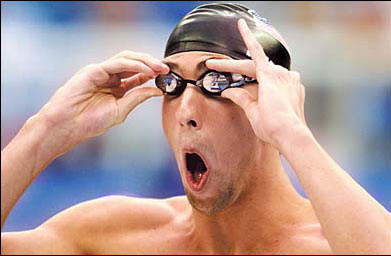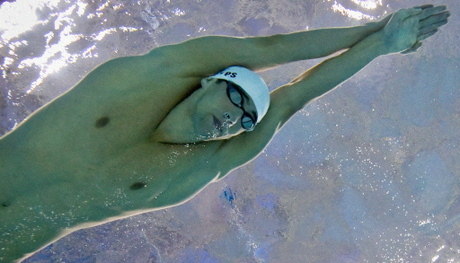Weighed in gold, Michael Phelps is worth about $3 million. In reality the face of the Beijing Olympics is probably worth 10 times that amount each year.
Marketing experts said the 23-year-old American, who is now the most successful Olympian with 11 gold medals, will become the richest professional swimmer ever, far surpassing the money earned by the former most decorated US swimmer, Mark Spitz.
"He's the greatest Olympian in the world and he'll be able to earn money everywhere as he's an international brand," Australia-based celebrity agent Max Markson told Reuters.

Michael Phelps of the US adjusts his goggles before the start of his men's 200m individual medley semifinal at the National Aquatics Center at the Beijing 2008 Olympic Games August 14 2008. [Agencies] |
"He's a billion-dollar man. He won't have to get a job ever. He can live off this for 50 years."
Olympic sports have meant big business since the Olympic movement allowed professional athletes to compete 20 years ago.
But none has banked the sums earned by charismatic megastars like Tiger Woods, David Beckham or Michael Jordan whose names are globally known and set cash registers ringing everywhere.
Eli Portnoy, chief brand strategist at the Portnoy Group, a US consultancy specialized in branding, doubted Phelps - or any Olympian - would match the earning power of Woods, who is estimated to become the first billionaire athlete by 2010.
Phelps reportedly earns about $5 million a year from endorsements although his agency Octagon declined to comment. Portnoy forecasts this rising to about $30 million, short term.
"In the heat and intensity of this event it may seem that his earning power is limitless, but you have to pull back and look at someone like Tiger Woods who has performed at a top level for years and years in front of the world," he said.
"The Olympics is only held once every four years. After a year to so Americans forget about the Olympics and move to stars they see more. Kids want someone else on their Weetabix box."
The Phelps phenomenon
Phelps is already the epitome of the modern American corporate Olympian with the Phelps Machine in full swing before he topped the record nine gold tally held by Spitz and Carl Lewis, Finnish runner Paavo Nurmi and Soviet gymnast Larysa Latynina.

This picture taken on August 13, 2008 shows an underwater photograph of US swimmer Michael Phelps competing during the men's 200 meter individual medley heat at the National Aquatics Center during the 2008 Beijing Olympic Games in Beijing. [Agencies] |
Phelps, who became a professional swimmer at 16 and a millionaire by 18, has sponsors, agents, lawyers, accountants, charities, his own website in English and Chinese, and even his own logo with a wave-like blue M and red P over his name.
An Octagon spokesman said his sponsors were credit card company Visa Inc., Speedo, watch maker Omega, AT&T Wireless, energy food company PowerBar. Kellogg's, Rosetta Stone, and PureSport. He declined to say what they paid Phelps.
Within seconds of Phelps' snapping up his 10th gold medal, Visa released a special edition television commercial commemorating his title as the most decorated Olympian.
"You need to be out there early and establish your affiliation with the property, Michael Phelps," said Michael Lynch, head of global sponsorship management at Visa whose relationship with Phelps dates back to 2002.
"His performance here will benefit us as it will add to the visibility we will get through this affiliation ... and his earning ability will increase, there's no question of that."
Portnoy said Phelps' youth and composure under pressure made him a marketer's dream. The only blotch on his record was an arrest for drinking and driving in 2004 for which he apologized.
"In the short term, he is a gold mine because he represents everything that is pure, young, strong and visionary about America. We haven't had anyone of this significance since Mark Spitz," said Portnoy.
"Guaranteed there will be marketers wanting a piece of him that make no sense and it will be interesting to see how his handlers cope with this and if they get greedy because the Olympics has a narrow avenue of marketability."
Agencies